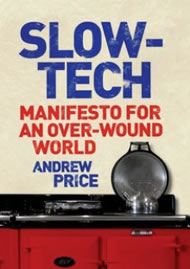A CENTRAL PILLAR of our society is the drive for efficiency. Extracting the most in the shortest period of time is the motivation behind the vast majority of actions in the modern world. As a concept, efficiency is so ingrained in our consciousness that to call it into question can seem counter-intuitive, if not completely ridiculous. We do not build excess into a system, because it appears to us, with our ‘corporate goggles’ on, to be a waste of resources. Yet, as I write, our economy, the epitome of a system based around the concept of efficiency, is collapsing around our ears. This book is a timely intervention into what the author describes as the conflict between the “efficiency of industry and development and the robustness of ecosystems”.
At its heart this conflict seems to be between opposing ways of conceiving of efficiency and robustness. Here in the modern world we consider an economy robust “because of how much money it makes, and how many services/items it produces, rather than how productive it may be in the long term”. As Andrew Price points out, this view is incomplete, “for it does not allow for longevity”. Our “superficial efficiency” drives out all robustness, relegating such pesky issues as the environment and society to the role of externalities – a “dispensable surplus”.
Whilst it is a highly topical example it isn’t just our approach to economics that is in need of change. As the title suggests, a large part of the book is concerned with specific technologies, particularly the precarious nature of our many high-tech modern solutions.
One of the first systems and its technology to come under scrutiny is modern agriculture. Price identifies current, industrial agricultural practice as the “number one threat to robustness of ecosystems and hence to Earth and humanity”. In a chapter that draws together the insights of some of our best thinkers on the subject (James Lovelock, Jules Pretty and Colin Tudge, to name a few) he expounds a pragmatic use of technology in agriculture. Where it is clearly for the purposes of maximising production for efficiency and profit, as opposed to optimising production for robustness, the author, quite rightly, condemns its use. GMOs are not dismissed out of hand, although antibiotics are frowned upon. It is an undogmatic approach that requires we assess each situation, each new technology according to the rule of robustness.
Further chapters delve into the worlds of fishing, water, coastal ecology and more explicitly social systems such as health care, the military and aviation. In each case Price convincingly details his solution of robustness against efficiency, from the “robustness as back-up or insurance” of natural ecosystems (through their myriad of species) to the robustness as ability to change or evolve, inherent in genetic algorithms.
When I’m not writing I work in a library. I watch as ‘low-tech’ books are replaced with high-tech e-texts and online databases, as the drive for efficiency forces staff reductions, closures and a decrease in the services offered. The internet is cited as the major reason behind these changes. It is changing the way we search for knowledge and subsequently libraries are changing. Yet, considering peak oil and climate change, will the internet be around forever? This is just one smaller, more personal example of how in our desire to discard the old, low-tech methods in favour of the high-tech we are undermining our ability to cope with the uncertainties the future will bring. That the central argument of this book struck such a highly personal note for me, as it will no doubt do for many others, is perhaps its highest recommendation. •
Dan Grace writes and works in a library.







